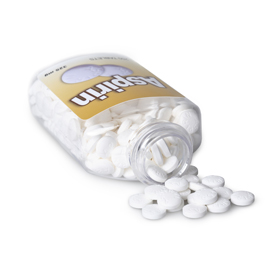Aspirin and Esophageal Cancer: The Connection
Posted: Jul 14 in Medical Treatment by Staff
 Aspirin is regarded as one of the best resources available in preventing heart attacks. Daily use of aspiring is only recommended for those who are deemed at risk for chronic heart disease, but when used correctly the blood thinner has helped save the life of countless individuals.
Aspirin is regarded as one of the best resources available in preventing heart attacks. Daily use of aspiring is only recommended for those who are deemed at risk for chronic heart disease, but when used correctly the blood thinner has helped save the life of countless individuals.
This well-known fact has led many to assume that aspirin has the ability to help with other chronic health problems, as well. While heart burn and heart disease may sound similar, they are actually incredibly different health problems that have little in common. That being said, there is a new body of evidence that points to aspirin as a potential supporting agent in the fight against certain forms of cancer, including esophageal cancer.
Benefits and Setbacks of Aspirin
In a study out of a University in London, researchers found that taking aspirin daily for an extended period of time, that is for between five and ten years, showed considerable health benefits outside of the prevention of heart disease. Individuals who took aspirin daily were also at a reduced risk of certain forms of cancer, as well as showing a reduced risk of stroke.
Specifically in regards to esophageal cancer, the research indicated that taking aspirin daily for five years was connected to a 58% reduced chance of fatality from the disease.
The problem with this information is that taking aspirin daily does come with its own set of risks and setbacks. Aspirin is a blood thinner, and so it can result in increased bleeding. Those with ulcers need to be especially careful of using the painkiller so often. And while this research finds evidence that using aspirin daily can reduce the risk of mortality connected to esophageal cancer, it does not do nearly as much in preventing this form of cancer as does preventative treatment for acid reflux disease. Protecting the esophagus from harm is a much stronger approach to take in preventing esophageal cancer, and aspirin does nothing in the treatment of heartburn and acid reflux. There is even evidence that the regular use of aspiring can actually worsen the symptoms of GERD and lead to more severe issues of reflux and heartburn.
Before deciding to start using aspiring regularly, it is essential that you speak with your doctor to evaluate the benefits and setbacks in relation to your own health.
